Behind the Big Tech antitrust backlash: A turning point for America
“About 49% of all sales online happen in one place,” said Sen. Elizabeth Warren in October. “That’s Amazon. It collects information from every little business, and then Amazon does something else. It runs the platform … and then goes into competition with those little businesses. … We need to enforce our antitrust laws, break up these giant companies that are dominating big tech….”
Warren’s fairly nuanced argument — about a genre of alleged abuse on digital platforms — was not being made before an antitrust subcommittee or a law school class. She was addressing the nation during a televised Democratic presidential debate. Six other candidates then weighed in on the same issue, each trying to sound as tough as Warren. (Though research company eMarketer once estimated Amazon’s share of online sales at 49%, it revised its estimate to 37.7% this past June. An Amazon (AMZN) spokesperson says its share, when counting brick-and-mortar stores, is “less than 1% of global retail and less than 4% of U.S. retail.”)
The debate reflects a turning point in American history.
“I expect all four of the tech giants will be sued — maybe within the next 12 months,” said Bill Kovacic in an interview.
Kovacic, a Republican-appointed Federal Trade Commission (FTC) member from 2006 to 2011, and its chairman from 2008 to 2009, is predicting federal or state government antitrust actions against Google (GOOG, GOOGL), Facebook (FB), Amazon, and Apple (AAPL). Any one of these cases alone might represent the biggest competition case in decades — since the Department of Justice tried to break up Microsoft (MSFT) under the Sherman Act in 1998.
Astonishingly, the sentiment is bipartisan. The enforcers now encircling the four most innovative and investor-beloved companies in America include the Trump Justice Department; the majority Republican FTC; the antitrust subcommittees of both the Democratic House and Republican Senate; a posse of 51 state and territorial attorneys general pursuing Google, and a squad of 47 AGs dogging Facebook. By contrast, recall that when Justice sued Microsoft in 1998, only 21 AGs joined in — nearly three-quarters of them Democrats.
Many stars aligned to bring us here. Populist, anti-monopoly movements have been building since the 2000s, when debates over “net neutrality” drew attention to concentration in the telecom and cable industries. The financial crisis of 2008 then triggered fury over concentration in the banking industry. That’s when we, as a nation, found out that our financial institutions had become Too Big To Fail. Resulting outrage spawned both the Tea Party on the right and Occupy Wall Street on the left.
At the same time, economists’ empirical studies were gradually confirming what the populists sensed in their bones: growing concentration across all sectors; rising price markups; decreasing investment; a decline in startups; and dramatically increasing inequality of wealth.
A new group of antitrust insurgents
But what happened at the presidential debate in October also reflected a dramatic sea-change within the specialized biosphere of antitrust experts. It was driven by a loose collection of lawyers and economists who have become alarmed by the growing consolidation and concentration of corporate power occurring across all industries, and particularly evident in the technology industry. They fear the “curse of bigness,” a term coined over a hundred years ago by Louis Brandeis, the attorney and Progressive Movement leader who served as a Supreme Court justice from 1916 to 1939. For Brandeis, the antitrust laws served a much broader purpose than is assumed today. He saw concentrated economic power as dangerous in itself. It could disrupt communities, crush small businesses, throw employees out of work, and pose a threat to democracy. It’s a perspective that resonates in a nation that has discovered that policies adopted by private companies like Facebook or Google may impact the outcome of elections.
Though a disparate group, these reformers all argue that the standards and precepts that have guided antitrust enforcement for the last 40 years are misguided, inadequate, and even fraudulent. They demand a new approach — or, more precisely, a very old one.
“Every revolution is always styled as a counter-revolution,” notes Columbia Law School professor Tim Wu, slyly, in an interview.
The insurgents have coalesced under some non-mellifluous rubrics: The Neo-Brandeisians or the New Brandeis School. Best known for coining the phrase “net neutrality,” Wu helped baptize this new movement in a slim volume he published last November, “The Curse of Bigness.” The 139-page manifesto quickly became a Washington Post bestseller — quite an achievement for a tract about the history and philosophy of American competition law. (Last month, Wu published, in the technical language of antitrust specialists, a distillation of the movement’s core tenets.)
The Neo-Brandeisians blame the rise in monopolies and oligopolies on the ascendancy of the Chicago School of law and economics in the 1970s and 1980s, and especially on the teachings of its most combative evangelist: the late law professor, U.S. Solicitor General, federal appeals court judge, and rebuffed Supreme Court nominee, Robert Bork.
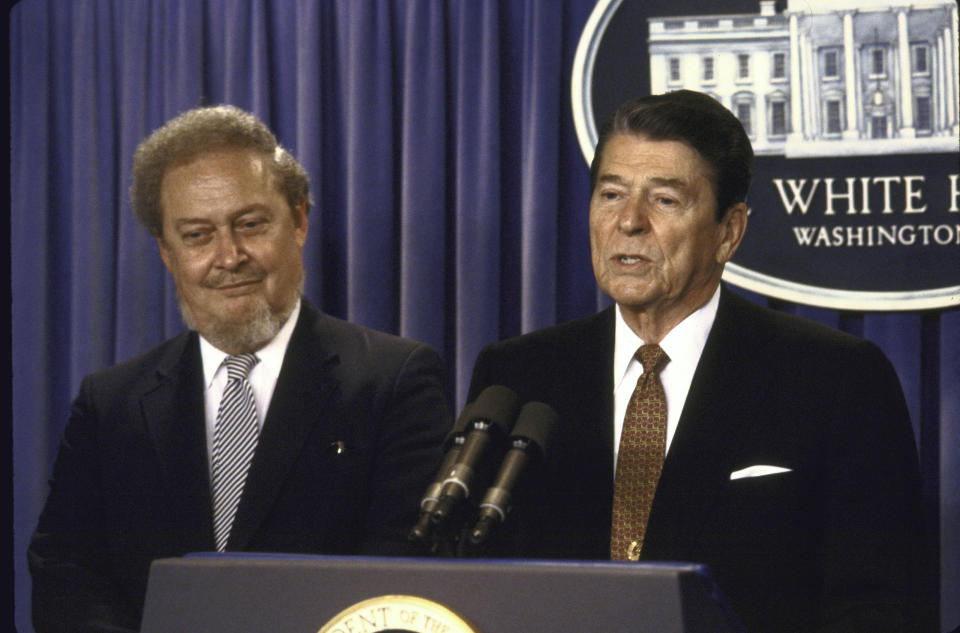
Bork preached that the sole legitimate purpose of the antitrust laws was to advance “consumer welfare.” In practice, that standard has come to focus narrowly on the question of whether suspect practices can be proven to raise prices for consumers. Cases hinge on abstruse, inconclusive, swearing contests between equally credentialed economists. The government’s burden is hard to meet.
So long as a company’s prices were low, Bork preached, its “bigness” and market dominance were likely just signs of efficiency and innovativeness. These were qualities to be lauded, not hobbled.
“This was an antitrust with the ‘anti’ removed,” Wu wrote in his book, “a law that now glorified monopoly instead of condemning it.”
Wu’s book preached a return to Brandeis’ broader and more commonsensical view of antitrust — one that saw extreme concentrations of economic power as threats to democracy. This was also, Wu noted in his book, the view of Senator John Sherman — the sponsor of the Sherman Antitrust Act of 1890 — who characterized the power yielded by monopolist CEOs as “a kingly prerogative, inconsistent with our form of government.”
Wu’s “small book about bigness,” as he described it, struck an instant chord. Within a week of publication, leading columnists for The New York Times and Bloomberg were calling for the breakup of Facebook, citing his book. Wu seemed to have done to the Chicago School what Hans Christian Andersen’s little boy did to the emperor-with-no-clothes.
But Wu didn’t found this movement. It was kick-started nearly three years earlier, when a then-27-year-old Yale Law School student, Lina Khan, published a tour-de-force law review article about Amazon. Her piece was an indictment of both Amazon’s alleged abuses and of the misguided Chicago School assumptions that, in her view, were allowing those abuses to thrive. (Now on leave from her academic fellowship at Columbia Law School, Khan is counsel to the House antitrust subcommittee, which is conducting a probe into — you guessed it — Google, Facebook, Amazon, and Apple.)
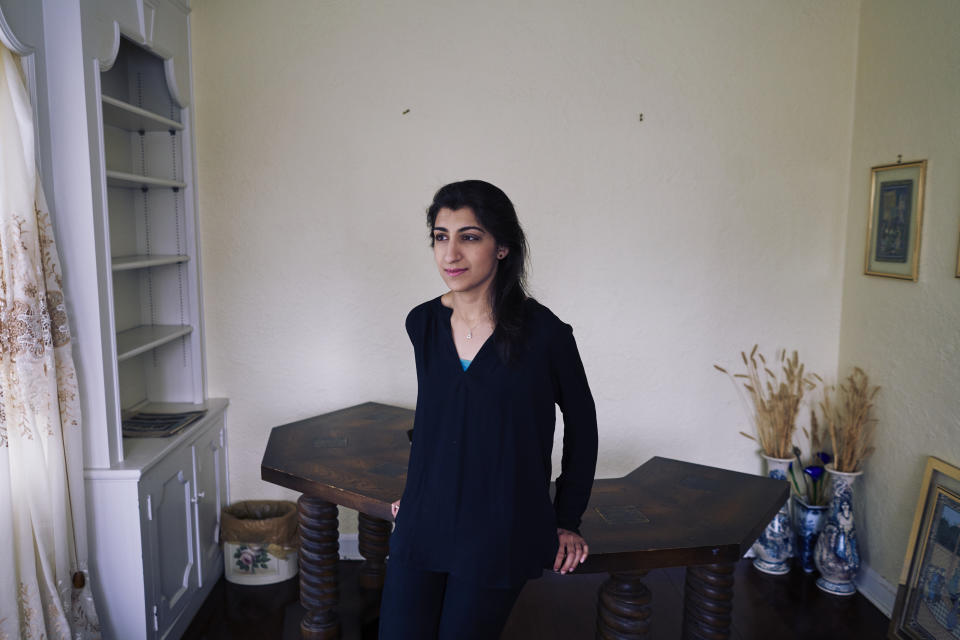
Khan’s progenitor, in turn, was neither a lawyer nor an economist. Before law school, Khan had spent three years working for Barry Lynn, the journalist who leads a think tank now known as the Open Markets Institute. In Lynn’s pugilistic 2010 book, “Cornered: The New Monopoly Capitalism and the Economics of Destruction,” he blamed the “Chicago School operators” for the toxic rise of concentration in America, characterizing them as “a tiny elite” disseminating “political lies” with “economically deranging effects.” He called for a return to long discredited approaches to antitrust, including Brandeis’. In the years since, Lynn and his group have relentlessly publicized the ideas of Khan, Wu, and other anti-monopolists, including blogger, congressional staffer, and Twitter warrior Matt Stoller, who wrote his recent book, “Goliath: The 100-Year War Between Monopoly Power and Democracy,” while a fellow at Open Markets.
“In five years, Barry and his group have changed the debate,” said Kovacic, a George Washington University law professor who is not himself a member of the movement. “They’ve gone from being a largely unnoticed fringe body of commentary to being at the very center of the debate.”
To be sure, the Neo-Brandeisians still represent a small minority of voices clustered toward the left end of the antitrust spectrum. At the opposite pole are the Chicago School stalwarts and their descendants. Though their ranks are thinning, they still hold down the fort, which is heavily armored with decades of judicial precedent. The conservative Supreme Court presumably has their backs.
Importantly, most antitrust experts of the center and even center-left also reject the New Brandeisians’ more extreme goals. Though the middle-of-the-roaders also seek more enforcement, and also deplore the Chicago School, they say the Brandeisians’ “wild, wild west” approach would be “unadministrable.” These centrists think they can work comfortably within the consumer-welfare framework, so long as enforcers consider factors other than price — and grow some backbone.
“Wholesale changes to the antitrust laws, such as introducing a new standard, could throw enforcers and courts into disarray,” said Diana Moss, president of the progressive, pro-enforcement American Antitrust Institute. “It would stymie enforcement at a time when we need stronger enforcement more than ever.”
Still, the Neo-Brandeisians are important beyond their numbers. Much as the Chicago School once dragged antitrust’s center to the right, the Neo-Brandeisians are now dragging it back. How far they get will decide whether new legislation gets passed, new cases get brought, and whether those cases are seen as viable in court. This article is about the Neo-Brandeisians — who they are, how their ideas gained traction, and whether those ideas make sense.
A light bulb moment for Barry Lynn
In September 1999, a powerful earthquake struck Chi-chi, Taiwan, killing nearly 2,500 people. It also knocked out power to the airport. That, in turn, had unanticipated follow-on impacts on factories dotted across California and Texas, more than 7,000 miles away.
“There were many fewer Furbies that Christmas,” recalled Barry Lynn, who was then the editor of a trade publication called Global Business. The Furby was a then-popular robotic toy. When Lynn looked into the situation, he concluded that American industry had dodged a bullet. Dozens of factories were all sourcing vital semiconductors from foundries clustered in Hsinchu, Taiwan, owned by just two companies. If the earthquake had damaged the foundries themselves, it would have caused severe, lasting disruptions — not just to HP, Compaq, and Dell, but to Caterpillar and Boeing, too, he said.
He started writing a book about industrial concentration and the fragility of supply chains.
Lynn grew up in Plant City, Fla., in a lower middle-class family. “My dad was an insurance adjuster, then he sold insurance, and then he mowed lawns,” he said. When his father lost his job and his mother got sick, they became poor, he continued. But Lynn got a scholarship to Columbia and, upon graduation, became a journalist.
After a stint in Latin America — for awhile he covered the Shining Path guerilla war in Peru for the Associated Press — he returned to America in 1994 to run Global Business, delving deep into the nitty-gritty of globalization.
In 2004, as he neared completion of his supply-chain book (“End of the Line”), a light bulb went on in his head. “The key revolution has nothing to do with trade policy,” he recalled realizing. “The key revolution actually has to do with competition policy.”
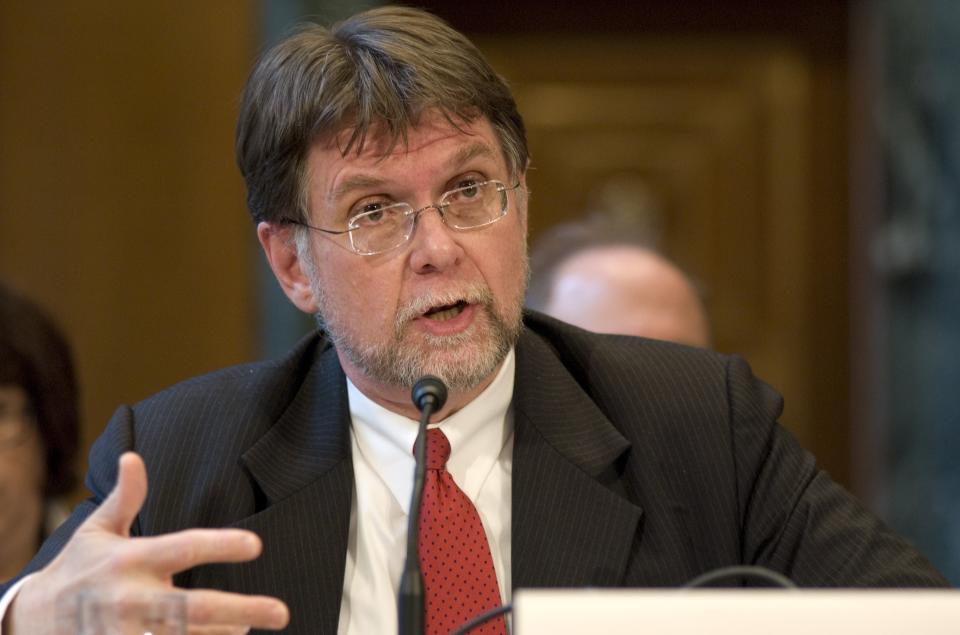
He’s talking about the intellectual transformation wrought by the Chicago School. In the antitrust realm, its greatest encapsulation was Bork’s “The Antitrust Paradox” of 1978. Among other things, the book incorporated his argument that Congress had intended the Sherman Act solely as a “consumer welfare prescription” — an extremely narrow interpretation.
“A fabrication,” Kovacic called it. “I think every historian who has examined Bork’s evidence has found it wanting.”
Nevertheless, the Supreme Court endorsed Bork’s view in 1979, citing his book, and that falsehood remains the law of the land.
When President Reagan took office in 1981, he appointed Chicago School apostles and acolytes to key courts of appeals, and installed another to head the antitrust division at Justice. Merger guidelines at both Justice and the FTC were rewritten to reflect Chicago School precepts.
“[Chicago Schoolers] made a number of assumptions,” said Fiona Scott Morton, an economics professor at the Yale School of Management. “Such as, markets will self-correct; cartels will fall apart by themselves; oligopolies will charge marginal cost because they’ll feel threatened by potential entry; nobody would ever engage in predatory pricing, because it’s irrational.” (Predatory pricing means pricing below marginal cost to drive competitors out of business.)
“On top of that,” she continued, “was the idea that the real harm was caused by over-enforcement. And that there really wouldn’t be any harm associated with under-enforcement [because, again,] markets will self-correct.”
In a nutshell, regulators came to fear false positives (i.e., bringing an unnecessary case) more than false negatives (failing to bring a needed one), as antitrust people often put it.
Lynn’s “Cornered” came out in 2010. His editor had told him, he recalled: “Barry, there are only two rules. I don’t want the word ‘Walmart’ on the cover, and I don’t want the word ‘Amazon’ anywhere.” He complied.
Part of the book took aim at the Chicago School — a message that was in-line with the mainstream, liberal, antitrust critique. The whole raison d’être of the American Antitrust Institute, founded in 1998, had been to debunk and resist Chicago School thinking.
More controversially, though, Lynn went on to call for a resurrection of broader antitrust approaches, like Brandeis’, that had fallen into disfavor long ago, even before the Chicago School came along.
Lynn’s book sold fairly well, but antitrust specialists largely dismissed the more controversial theses. It didn’t cite a single living attorney in support of those.
But some would soon appear. By then, Lynn was working from the offices of New America Foundation. Though New America gave him a desk, he still had to hustle grants and publish freelance articles. In 2010, the Nathan Cummings Foundation gave him a big donation, enabling him, in 2011, to hire his first full-time employee.
It was Lina Khan, who was fresh out of Williams College. Born in London to Pakistani parents, she’d come to the United States when she was 11. She’d nearly completed a major in economics before graduating in political theory, and she’d written her thesis on the Hannah Arendt (a philosopher whose work included “The Origins of Totalitarianism”). Lynn was impressed.
“She was able to see power systems,” he says. “A lot of people attracted to economics don’t actually understand power. Or don’t want to.” (Citing her current position at the antitrust subcommittee, Khan declined comment for this article.)
‘Amazon, as best I can tell, is a charitable organization’
Over the next three years, Khan published more than 20 articles about industrial concentration in such publications as Washington Monthly, Quartz, Mother Jones, Slate, CNN.com, Foreign Policy, American Prospect, and the Washington Post. By 2014, she was paying close attention to Amazon.
By then, Amazon had become involved in an unusual antitrust case. In some ways, it epitomized what was skewed about contemporary antitrust law. In 2012, the Justice Department brought a Sherman Act case on Amazon’s behalf. Though Amazon had a near monopoly in the relevant market, Justice intervened to protect it from the depredations of a would-be new competitor!
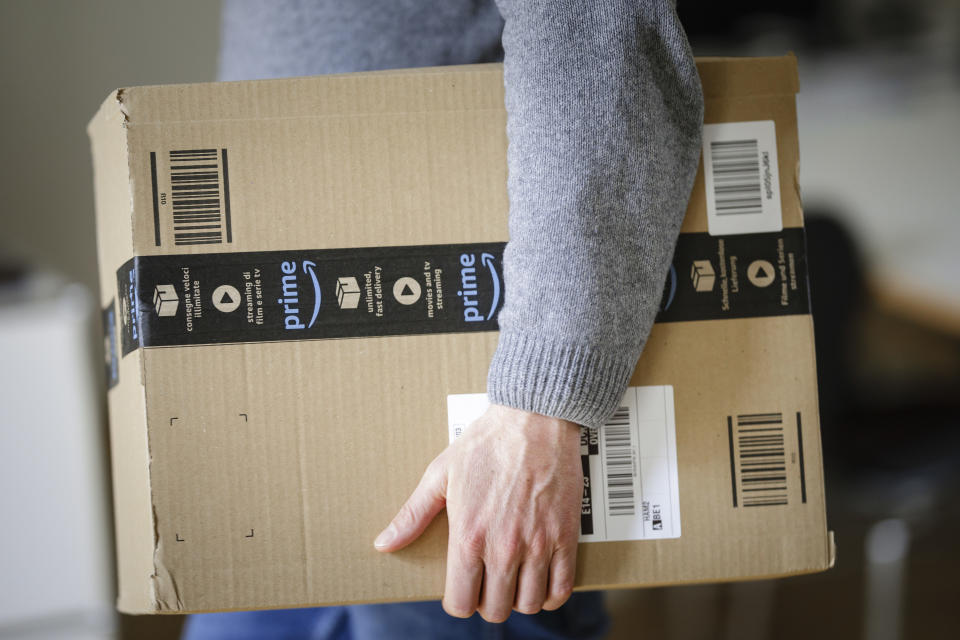
The stage was set in late 2009, when Apple was about to introduce its new iPad. Apple wanted to start offering an eBooks service, using the iPad as its Kindle. Amazon then controlled 80%-90% of the eBook market, so Apple would be its first meaningful competitor.
But Apple wasn’t going to enter the market if it had to sell eBooks at a loss. And that was the only option, because Amazon was retailing nearly all its New York Times bestseller eBooks — the heart of the market — at $2, $5, or $7 below wholesale cost. Publishers were furious, because Amazon’s eBooks were cannibalizing sales of their hardback editions — their most profitable products. That, in turn, was squeezing their whole business model. It was forcing them to stop taking chances on unknown authors, they claimed, and focus on sure-thing blockbusters, like celebrity bios, to the detriment of society.
So Apple offered publishers something Amazon wouldn’t: control over the retail pricing of their books via “agency” contracts. The publishers eagerly grabbed the deal. Then they turned around and demanded that Amazon switch to the agency model too. Amazon ran to the Justice Department, crying foul.
Sure enough, justice took Amazon’s side. It didn’t matter that Amazon was the overwhelmingly dominant player, or that its below-cost pricing had a predatory odor. The Chicago School hypothesized that predatory pricing almost never occurred in real life — and even if it did, that it usually benefitted consumers. The Supreme Court had adopted this perspective in 1993, citing Bork.
In the single-mindedly price-centric world that the Justice Department now lived in, this was an easy case. Apple and the publishers were the bad guys, since they had colluded to drive up prices.
In 2013, the judge ruled for the government, and in 2015 her ruling was upheld on appeal, 2-1. The perplexed dissenting judge protested that what Apple had done was “unambiguously and overwhelmingly procompetitive.” (Though Amazon’s share of the ebooks market fell to about 60% after Apple’s entry, it has climbed back up to 83% since the Justice Department intervened.)
Although Khan was troubled by the eBooks case, she was mainly focused on getting to the bottom of how Amazon worked. Why did Amazon’s share price keep shooting upward despite the fact that its profits were always either razor thin or negative? Slate’s Matt Ygelias had famously captured the anomaly in January 2013, writing: “Amazon, as best I can tell, is a charitable organization being run by elements of the investment community for the benefit of consumers.”
Khan began interviewing investors, hedge fund managers, and small businesspeople who sold products over Amazon’s platform. In fall 2014, however, she departed for Yale Law School, taking her stack of Amazon notes with her.
At law school, she decided to use them to write a law review article that would tell a broader story about how the law had changed. There, she took her first course in antitrust, which was taught literally under the gaze of Robert Bork, rendered in oils.
A ‘huge flip’ in Silicon Valley
Meanwhile, Tim Wu, already a law professor of renown, was on his own personal antitrust journey.
Wu, now 47, is the son of two immunologists. His father was from Taiwan — an activist in its fight for independence — and his mother from London, but Wu was born in Washington, D.C., and raised mainly in Toronto. After graduating from Harvard Law, Wu clerked for then-appeals court judge Richard Posner, one of the leading lights of the Chicago School, though also one of the most independent-minded. Wu then clerked for Supreme Court Justice Stephen Breyer, the most economically oriented of the liberal justices.
In the mid-2000s, Wu made his name writing about the internet, free speech, and telecommunications regulation. While researching his second book, “The Master Switch: The Rise and Fall of Information Empires,” published in 2010, he was drawn more deeply into antitrust law. In that book, Wu warned against the libertarian, laissez-faire ethic that had been on the rise since the 1970s. “If the stories in the book tell us anything,” he writes, “it is that the free market can also lead to situations of reduced freedom. Markets are born free, yet no sooner are they born than some would-be emperor is forging chains. … If we believe in liberty, it must be freedom from both private and public coercion.”
At about the same time, Wu was noticing “a huge flip” in Silicon Valley, as he called it. “It was the flipping of tech from what was widely assumed to be a perfectly competitive industry — with no possible barriers to entry — to suddenly and unexpectedly being dominated by lasting monopolies,” he said. In November 2010, Wu wrote about the phenomenon in the Wall Street Journal: “In the Grip of the New Monopolists.”
The next year, Wu took leave from Columbia to begin a two-year stint as an adviser to the FTC’s antitrust enforcement bureau. He became frustrated with what he saw.
“I was confronted with a group of really hardworking, well-meaning people, who were not doing a lot of cases,” he said. “They were timid, nervous about their authority, and only willing to do very safe cases.”
Wu believes the timidity was linked in part to the consumer welfare standard.
“We frequently came across people complaining about troubling behavior that — from a Brandeisian perspective — seemed like the very definition of unfair competition,” he said. (Brandeis helped draft the law that created the FTC.) “Deception,” he continued. “Predation. But often the question would be, ‘Okay, well where’s the price effect?’”
In theory, Wu acknowledged, the consumer welfare standard did permit regulators to take into account harms other than just price increases — like reductions in product quality or innovation. But non-price harms were much harder to quantify. “And without numbers, action is rare,” Wu said.
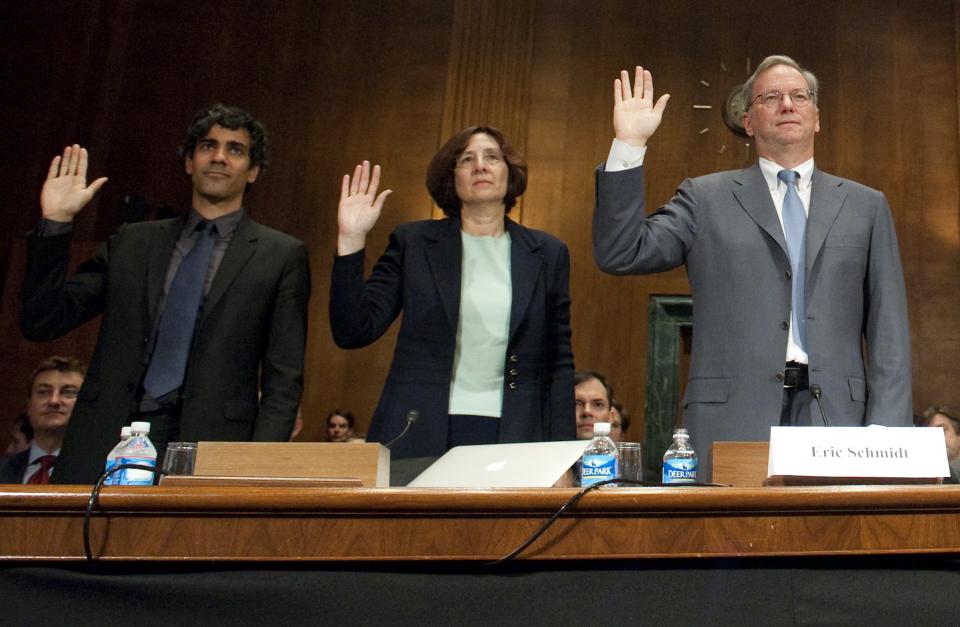
While he was at the FTC, the agency was conducting an early probe of Google. “The most troubling conduct,” Wu recalls, “was against Yelp and TripAdvisor.” Although Google had once worked with those companies, paying them for permission to highlight their reviews in its search results, in 2007 Google began offering its own reviews, competing with them. Yelp and other “local search” companies alleged — and still allege — that Google gives its own reviews preference over theirs in its search results.
In 2009 Google tried, but failed, to acquire Yelp. Then, beginning in 2010, Google actually began reprinting Yelp’s, TripAdvisor’s, and CitySearch’s reviews, without permission or attribution, to help jump-start its own competing service. According to Yelp, Google refused to stop this practice, despite protests, until two days after Yelp complained about it at a conference of state attorneys generals in Kona, Hawaii, in July 2011.
“What [Google] did felt to me like an unfair method of competition,” says Wu. “An illegal act. They cloned Yelp, made their own local reviews, then they stole Yelp’s, and put them in. But one of the main problems was proving harm to consumers. ‘So, yeah, they stole stuff from Yelp, but consumers now have two options — Google and Yelp. And Google’s faster, because it’s right there. So where’s the problem?’ I found that frustrating.”
The FTC closed its investigation of Google’s local search practices in 2013, taking no action. “Undoubtedly, Google took aggressive actions to gain advantage over rival search providers,” the FTC press release explained. “However, the FTC’s mission is to protect competition, and not individual competitors.”
“The conclusion is clear,” said Google’s David Drummond, Senior Vice President and Chief Legal Officer, at the time. “Google’s services are good for users and good for competition.” A Google spokesman declined further comment for this article, referring Yahoo Finance to a general statement Drummond posted on a Google blog in September about the company’s commitment to consumer choice, innovation, and “robust and fair competition.”
Meanwhile, Amazon was bigfooting itself into the news in ways that reeked of monopolistic hubris. In May 2014, while in contract negotiations with Hachette Book Group, Amazon removed pre-order buttons from most of Hachette’s titles, stopped recommending its author’s books, and saddled their books with delivery delays. At the time, Amazon still controlled 60%-70% of the e-book market, and had cornered 40% of the total book market (print and digital).
Douglas Preston, a Hachette author who wrote thriller novels, started a protest petition that was eventually signed by more than 900 writers, including Michael Lewis, Robert Caro, and Malcolm Gladwell. He also formed Authors United, a group that reached out to Barry Lynn for assistance. Lynn and Preston, assisted by the Authors Guild, later wrote to the Justice Department, but nothing came of it.
That October, the then-editor of The New Republic (TNR), Franklin Foer, wrote a cover story called “Amazon Must Be Stopped.” (Foer’s father, Bert Foer, founded the American Antitrust Institute, which he led till his retirement in 2014.) Frank Foer recognized that contemporary antitrust law all but immunized Amazon’s conduct, but protested that something had to give. “If we don’t engage the new reality of monopoly with the spirit of argumentation and experimentation that carried Brandeis,” he wrote, “we’ll drift toward an unsustainable future, where one company holds intolerable economic and cultural sway.” (The article cited Brandeis 10 times and hat-tipped Lynn, once, too.)
Eighteen days later, Amazon cancelled a major ad campaign with TNR, expressly in retaliation for Foer’s story. Foer was forced out as editor six weeks later, although that, according to The New Yorker, was the culmination of months of drama with TNR’s then owner, Chris Hughes, the billionaire cofounder of Facebook. (Though cast as the villain in that affair, Hughes’ own story has taken turns since then. Last May he urged the breakup of Facebook in a New York Times op-ed, and in October he announced the creation of a $10 million “anti-monopoly fund” to “move the issue from the margins to the mainstream.”)
The ‘real big bang’ for antitrust
Although the FTC let Google off the hook, the European Commission did not. In April 2015, competition director Margrethe Vestager announced formal charges against Google for allegedly abusing its dominance in search — about a 90% share in Europe — by giving preference to its own services over competitors’ in search results. (The EC focused on comparison-shopping sites, rather than local search, but the accusation was very similar.) At the same time, Vestager announced the initiation of a second formal inquiry into whether Google was also abusively leveraging its Google Android platform, present in 80% of smartphones, to extend its dominance in search.
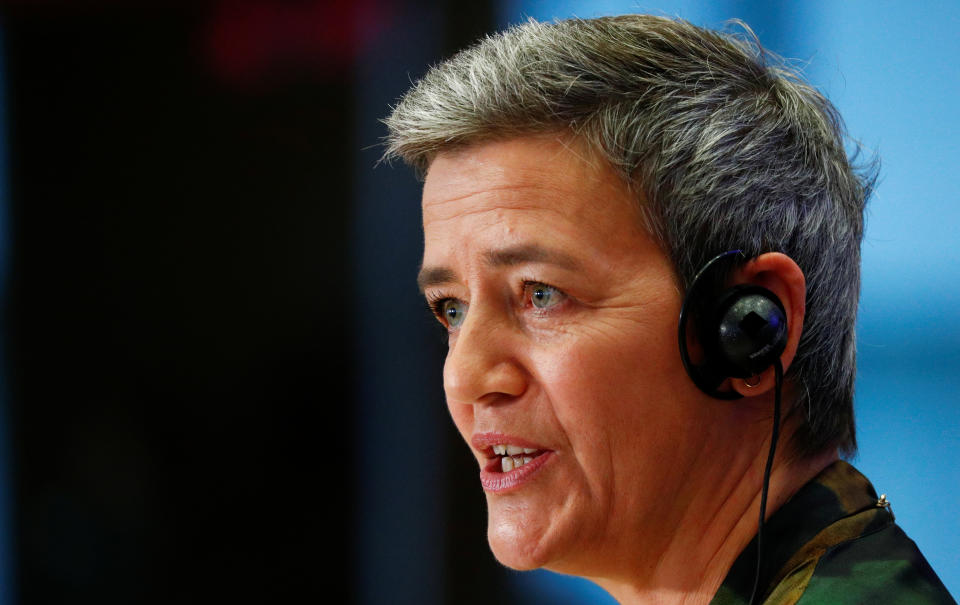
“The real big bang was April 2015,” said Luther Lowe, senior vice president of public policy at Yelp, referring to Vestager’s twin announcements. “That gave everyone else permission to begin asking tougher questions.”
Later that year, Jason Furman, then chairman of Obama’s Council of Economic Advisers, presented a technical but impactful paper at Columbia. His study, conducted with Peter Orszag, then a Citi vice chairman and Brookings Institution fellow, suggested links between a “less-than-perfectly-competitive marketplace,” “super-normal returns on capital,” and “rising wealth inequality.”
It was part of an accumulating body of academic literature that Wu called “pivotal” in propelling today’s antitrust revitalization movement. (Last May, Yale’s Fiona Scott Morton published an interactive database of economic research since 2000 assessing antitrust enforcement policy. “The bulk of the research,” she wrote, “finds evidence of significant underenforcement of antitrust law … [and] evidence of undue market power in many dimensions, among them price, quality, innovation, and marketplace exclusion.”)
The mounting data led to a startling cover story in the Economist in March 2016. The headline was: “Winners Take All: Why High Profits Are a Problem for America.” The magazine — not Mother Jones, mind you, but The Economist — warned that “high profits … can signal the existence of firms more adept at siphoning wealth off than creating it afresh, such as those that exploit monopolies.” The story’s website subtitle was: “America needs a giant dose of competition.”
By then, Wu was an adviser to President Obama’s National Economic Council. (He had recently finished a stint in competition enforcement at the New York Attorney General’s Office. In 2014, he ran for lieutenant governor on a ticket with Fordham Law School professor Zephyr Teachout, but lost in the primary.) Wu and his White House colleagues were looking at the Furman study and like data — and feeling sheepish.

“Under our watch, wealth and income inequality has increased and corporate concentration has increased,” he recalled people thinking. “We’re like, what did we do wrong here? A lot of fingers pointed to antitrust. We didn’t quite succeed in revitalizing antitrust.”
In April, President Obama issued an executive order requiring all agency heads to look for ways to increase competition. But there were just eight months left in his administration.
A few months earlier, a staffer for Sen. Elizabeth Warren had reached out to Lina Khan. Though now in her second year of law school, Khan was still a fellow with Lynn’s Open Markets program at New America, and publishing provocative articles. Warren wanted Khan to set up a meeting to discuss antitrust issues.
In March, Khan, Barry Lynn, and Teddy Downey, the executive editor of The Capitol Forum — a publication focusing on competition issues — met with Warren over dinner at her Senate office.
Warren didn’t need any tutoring, Lynn recalled.
“You’d say something, and immediately she understood it, and she’d bounce off of it, understand all the implications. This direction, that direction. It was like, wow.”
About six weeks later, Warren’s staff contacted Lynn’s group again. She wanted to deliver a keynote, and asked if Lynn’s Open Markets would host. Lynn set up a program for late June at the Capitol Visitors Center.
“Today, in America, competition is dying,” Warren said in her luncheon address. “Concentration threatens our markets, threatens our economy, and threatens our democracy.”
Warren decried consolidation generically in a list of industries, but then called out three digital platforms by name: Google, Amazon, and Apple. She recounted how the European Commission had brought charges against Google for allegations almost identical to those the FTC had let pass. “Europeans may soon enjoy better protections than U.S. consumers,” she warned.
“That was the first time a U.S. senator had name-checked Google in a negative way,” said Yelp’s Lowe, who regards the speech as a watershed.
By then, Google had become a skilled practitioner of Washington influence. Starting from zero in 2003, Google had become the second highest-spending corporate lobbyist in 2012, when its first FTC inquiry started. (It was No. 1 last year, with more than $22.7 million spent. In 2019 so far, the two leaders are Amazon and Facebook.)
From his years fighting Google, Yelp’s Lowe has developed a jaundiced view of Washington. Now 37, he joined Yelp in 2008, two years out of college. He has been trying to interest regulators in Google’s alleged wrongdoing since at least 2011 — not just in the U.S. and Brussels, but in places as far-flung as Brasilia, Brazil, and Ankara, Turkey.
Google has orchestrated “a sort of ‘Truman Show’ in Washington, where everybody is an actor, pretending that Google is the best thing since sliced bread,” he asserted. It’s done that, he maintained, by spreading money around to academic programs, individual academics, and to nonprofits across the political spectrum.
In May 2012, for instance — during the FTC probe of Google — George Mason University’s Antonin Scalia Law School hosted a conference on internet search competition, inviting FTC regulators, congressional staffers, and federal and state prosecutors.
Two years later, the Washington Post revealed that the conference had been “in large part the work of Google, which maneuvered behind the scenes with GMU’s Law & Economics Center to put on the event.” Although Google had been listed as one of the event sponsors, it had urged the university to downplay the true extent of its role, and the university had complied, according to emails published by the Post. (“I think it would misrepresent this conference to suggest that it was a Google event,” GMU’s law school dean told the Post at the time.)
The 2016 presidential elections were disastrous for the tech giants, spawning bipartisan outrage. While the anger was not over monopolistic practices per se, it was triggered by the arrogance and awesome concentration of power that monopoly can breed.
Liberals blamed Facebook and, to a lesser extent, Twitter (TWTR) and Google’s YouTube, for Trump’s shocking victory. Facebook had negligently failed to detect and stanch Russian disinformation campaigns, they felt. At the same time, the Cambridge Analytica scandal highlighted Facebook’s faulty, opaque, and deceptive data privacy practices. (Facebook paid a record $5 billion fine last July to settle charges stemming from those events.)
Conservatives hated the tech giants, too, though. Candidate Trump equated Amazon with the Washington Post (because Amazon CEO Jeff Bezos owned it), and threatened to wield the levers of government — through taxation or antitrust enforcement — to punish Amazon for the Post’s unflattering news coverage. He had also called for a boycott of Apple for refusing to unlock iPhones at the FBI’s request.
More broadly, conservatives harbored long-standing grievances with Silicon Valley. They hypothesized that Google, Facebook, and Twitter skewed their algorithms or hate-speech enforcement to suppress conservative political speech. (The companies deny doing so.) They were also angered by Silicon Valley’s strong support for immigration rights.
Finally, it was indisputable that Silicon Valley’s PACs, executives, and employees had overwhelmingly supported Hillary Clinton. Google was the most blatant offender. Its parent company, Alphabet, had been Clinton’s largest corporate donor by far, with its PAC and employees donating more than $1.6 million. Then-Alphabet executive chairman Eric Schmidt had personally been an avid supporter, funding two of Clinton’s key tech vendors. He even provided strategic advice directly to the candidate — a fact that came to light via hacked DNC emails.
His huge bet had now badly backfired. A comic coincidence — not previously reported — allowed Google’s tiny nemesis, Yelp, to package Google’s mistake into an internet meme. The stage was set at the Javits Center in New York City on election night, where Clinton’s victory party was supposed to take place. Yelp’s Lowe was there. He was all-in for Clinton, too, had raised money for her, and had been rewarded with some VIP passes to the party.
Early in the evening, when the atmosphere was still festive and Lowe was a bit tipsy, he noticed Google chairman Eric Schmidt walking nearby.
“He has no idea who I am,” Lowe said, “so I think, ‘Wouldn’t it be funny to get an ironic picture?’” Lowe asked Schmidt to pose with him, and Lowe’s friend snapped a photo.
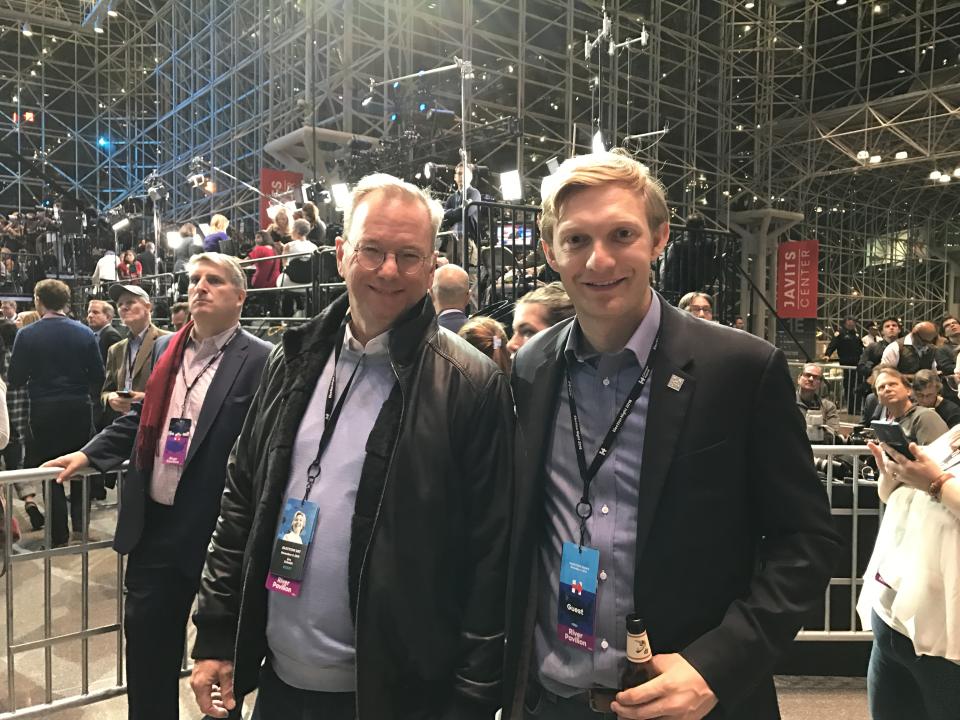
The next morning, as Lowe emerged from his melancholy hangover, he looked again at the picture. Schmidt was wearing a black badge, different from his own. He zoomed in. It read: “STAFF.”
At first, Lowe was deflated. “No matter how hard you work, they’re always going to be a step ahead,” he remembered thinking.
Then he began to think strategically. He cropped himself out of the photo and sent it to Politico. Outraged right-wing blogs picked it up, including Daily Caller and the Washington Free Beacon. Wikileaks posted the image on Twitter, where it was retweeted more than 10,000 times. Eventually it was reported in the Wall Street Journal.
Schmidt’s support for Clinton did not escape Trump’s notice. A few weeks later, while preparing for a meeting with tech executives shortly before the inauguration, Trump asked strategist Stephen Bannon if Schmidt was “the guy that tried to help Hillary win the election,” according to the Journal. Indeed he was, Bannon responded. Bannon then told the Journal that hostility to Big Tech would “a major, major issue” for the populist right in future elections. (Google declined comment on Schmidt’s behalf. Schmidt stepped down from Alphabet’s board in June, but remains with the company as a technical adviser.)
‘Amazon’s Antitrust Paradox’
In January 2017, around the time Trump was sworn in, Lina Khan’s student law review article, “Amazon’s Antitrust Paradox,” came out in the Yale Law Journal.
Ninety-seven pages long, with 464 footnotes, the piece began by reminding the reader of what Amazon now really is. “In addition to being a retailer,” she wrote, “it is a marketing platform, a delivery and logistics network, a payment service, a credit lender, an auction house, a major book publisher, a producer of television and films, a fashion designer, a hardware manufacturer, and a leading provider of cloud server space and computing power.” (Since the article was published, Amazon has purchased Whole Foods for $14 billion; started a second grocery chain; sought permission to launch more than 3,200 communications satellites; and announced plans to build more than 20 airport “gateways” for its Amazon Air cargo service, led by a $1.5 billion, 500-acre hub near Cincinnati.)
Khan then laid out a riveting thesis. Our current antitrust framework was not only unequipped to tame this behemoth; it had given birth to it. “It is as if [Jeff] Bezos charted the company's growth by first drawing a map of antitrust laws, and then devising routes to smoothly bypass them,” she wrote. “With its missionary zeal for consumers, Amazon has marched toward monopoly by singing the tune of contemporary antitrust.”
The article argued, in fact, that two of Amazon’s key business strategies are competition practices that were both once considered quite suspect: near-predatory pricing and vertical integration. But Supreme Court rulings — adopting Chicago School arguments — posited that predatory pricing rarely occurred in the real world, while vertical integration was presumed to benefit consumers. (Vertical integration refers to mergers within a supply chain. Though once scrutinized as closely as horizontal mergers — because they might make it hard for a new competitor to enter a market — the Chicago School posited that most vertical mergers would improve efficiency, lowering consumer prices.)
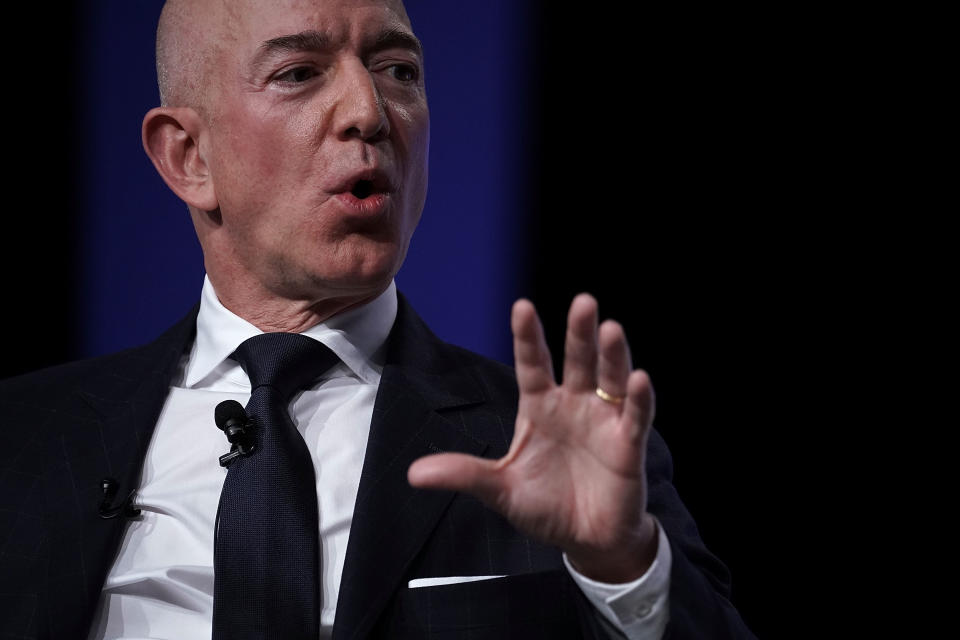
For example, Amazon used below-cost pricing, she alleged, not only to dominate the e-books market, but also to force a competitor, Quidsi, to succumb to its acquisition overtures in 2010. (Quidsi once ran Diapers.com, Soap.com, and BeautyBar.com.) She suggested that a digital platform like Amazon — with its opaque, fast-changing pricing policies and multiple related businesses — has many ways to recoup losses from predatory pricing that Chicago School theorists had never imagined. These made the practice quite rational for a dominant player to pursue.
Khan closed by recommending reconsideration of key legal precedents governing predatory pricing and vertical integration. Alternatively, she urged that Congress treat the dominant digital platforms as natural monopolies, and regulate them the way we do public utilities or common carriers, like railroads.
“I think it’s fair to say that in the now 130 years of the antitrust laws, no student law review paper has ever had the effect of Lina Khan’s article,” said Kovacic, the former FTC chair. (The digital version of her piece has attracted almost 200,000 clicks since publication, according to a Yale Law Journal staffer.)
Amazon declined comment on Khan’s article.
“I don’t think there’s anything new here,” said George Priest, a Chicago School thinker and the Yale Law School professor who taught Khan antitrust. Speaking of both Khan’s article and Tim Wu’s later book, “Curse of Bigness,” he said: “Brandeis had these ideas that big is bad back in the ‘20s, they’ve been totally rejected by economists, largely rejected in the courts, and I really don’t see what Wu and Khan are adding to this. It’s really the same old stuff.”
“Google, Facebook, Amazon, and so forth have built up platforms that are of very great value to society,” continued Priest. “Now the question is: Why shouldn’t there be a return on the innovation and investment these companies have made which have really transformed American society in many ways to the benefit of consumers?”
Other critics tried to laugh Khan off. They dismissed her ideas as “hipster antitrust,” a phrase amplified in a tweet by George Mason professor and former FTC commissioner Joshua Wright. The belittling term was further propagated by Sen. Orrin Hatch and, again, by Wright in a law review article subtitled, “The Dubious Rise and the Inevitable Fall of Hipster Antitrust.”
Former FTC chair and George Mason professor Tim Muris also co-authored a law review responding to Khan — funded by Amazon. Muris accurately observed that to the extent the reformers wanted to return to the “impressionistic ‘big-is-bad’ doctrine” of the antitrust past, they would be tossing out a lot more legal thinking than just the Chicago School’s.
As early as 1949, Muris noted, then law student and future Harvard professor Donald Turner — who already had a doctorate in economics — wrote his own influential student article. In it he criticized the government’s then-recent criminal prosecution of A&P under the Sherman Act. A&P had driven competitors out of business with a host of business practices that, while bare-knuckled, did not cross any well-defined line.
“Vigorous competition is not a friendly pastime,” Turner had written. “New methods of production and distribution not only disturb existing firms; they frequently demolish them. … This constant change to the … more efficient is the very heart of the process of effective competition.”
‘An impossible task’
Kovacic, the former FTC chair, agreed with Muris that the New Brandeisians are trying to upend more than just the Chicago School. In 1978 — the same year Bork’s “Antitrust Paradox” was published — Turner and Phillip Areeda, another star Harvard professor, published the first volume of an authoritative treatise that is still the most cited in the field. Usually referred to as just “Areeda and Turner,” this bible embodies what scholars refer to as the “Modern Harvard” school of antitrust, which is considered centrist.
Like the Chicago Schoolers, Areeda and Turner also argued that “antitrust should focus single-mindedly on economic effects and efficiency,” Kovacic continued. Not because that was Congress’s actual intent in 1890 — it wasn’t — but because any other approach was, in Areeda and Turner’s word, “unadministrable.”
“If I tell the judge,” explained Kovacic, “in evaluating this merger I want you to evaluate the effect on small and medium enterprises; the effect on employment; how it affects the individual communities in which the firms do business; efficiency; and also whether this merger is compatible with our traditions of democracy — Areeda and Turner said that’s an impossible task.”
Accordingly, Neo-Brandeisians face opposition not just from conservatives, but also from centrists and even many progressives. “Justice Stephen Breyer largely channels Areeda and Turner” on antitrust matters, said Kovacic. “If the Neo-Brandeisians go before the Supreme Court and say, ‘All this business about efficiency having primacy is rubbish, and we need this broader egalitarian framework,’ I can see Breyer leaning over and saying, ‘Really?’”
In June 2017, European Commission Competition Director Vestager announced the imposition of a $2.7 billion fine on Google for favoring its own comparison shopping services in its search results — by far its largest competition sanction ever. (A year later the EC would hit Google with an additional $5.1 billion fine, relating to Android, and this past March it tacked on $1.7 billion more for alleged unfair advertising practices. Google, which denies wrongdoing, has appealed all three judgments.)
Shortly after the EC’s June 2017 announcement, Barry Lynn, at New America, dashed off a short press release, congratulating Vestager and her people. He then added: “We call upon U.S. enforcers, including the Federal Trade Commission, the Department of Justice, and state attorneys general, to build upon this important precedent, both in respect to Google and other dominant platform monopolists including Amazon.”
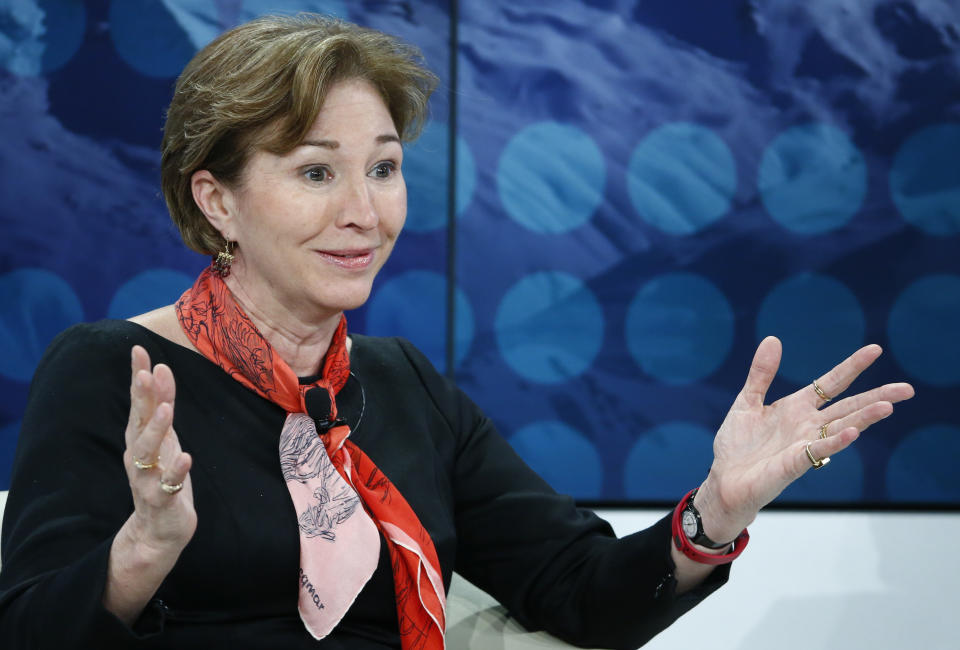
Soon thereafter, New America’s president, Anne-Marie Slaughter, heard from Schmidt, Alphabet’s executive chairman, according to a New York Times story published two months later. Google, Schmidt, and Schmidt’s family foundation had donated $21 million to New America since its founding in 1999, and Schmidt had been New America’s chairman until 2016.
Two days later Lynn, who’d then been with New America for 13 years, was summoned to Slaughter’s office. The day after that, he got an email from her saying that “the time has come for Open Markets and New America to part ways.” While her decision “was in no way based on the content of [his] work,” she said, his failure to cooperate was “imperiling the institution as a whole.”
By August, Lynn and his whole team — by then, seven full-timers, plus an unpaid fellow — were out, operating independently as the Open Markets Institute.
The Times story, by Kenneth Vogel, also revealed that Lynn’s earlier hosting of the Elizabeth Warren keynote — in which Warren singled out Google, Amazon, and Apple for antitrust scrutiny — had also caused internal stress. In the run-up to the event, Slaughter and New America’s lead fundraiser had each expressed concern to Lynn that Google’s views would not be represented. “Just THINK about how you are imperiling funding for others,” Slaughter wrote in an email.
New America said at the time that Lynn’s departure had nothing to do with Google or Schmidt, and Google told the Times that it played no role in the split. Slaughter later wrote a lengthy account of the incident, which she said was “at its core … a personnel issue.”
If Google played any role in Lynn’s departure, the act boomeranged. The page-one Times article and numerous follow-on stories lifted the profile of Lynn and his group immeasurably, and highlighted Google’s apparent behind-the-scenes role in Washington’s “Truman Show.”
‘It takes a lot of courage to face big companies’
Troubled by his experiences at the FTC and White House, Wu started a new book. Originally it was going to be about Louis Brandeis.
In legal academia, Brandeis is best known for his writings on the First Amendment and the right of privacy. But as he researched, Wu concluded that this portrait of Brandeis had been photoshopped.
“I was sort of shocked to discover that he had been an antitrust lawyer and competition person for the most of his life,” Wu said. “Somehow, he’d been thrown out of the canon of respectable economic thought. I felt like a white-washing had gone on.”
Over time, Wu’s book morphed into “impact writing,” he said. He ripped out a few chapters and laid them aside, to be reworked into academic papers later on. This book would aim for a wider audience.
While Wu thinks the consumer welfare standard “should be jettisoned,” he said, “I don’t think everything turns on it.” The chief goal of this book would be, instead, to revive the “big case” tradition of enforcement, he explains.
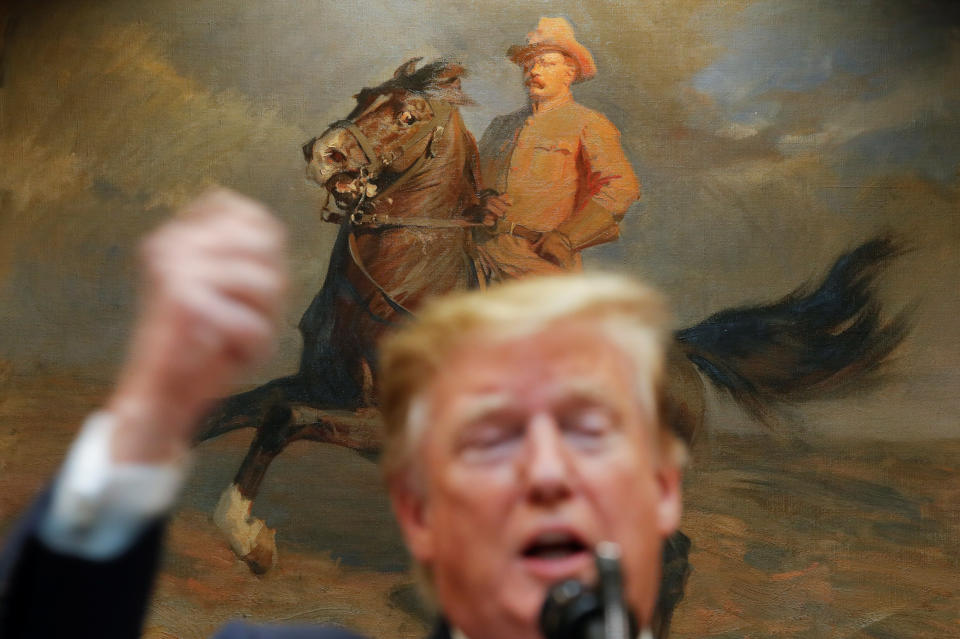
That tradition goes back to 1906, when President Theodore Roosevelt’s Justice Department sued to break up Standard Oil. But it has laid dormant since the Microsoft case of the 1990s, and there’s been no major breakup since 1982, when AT&T was dismembered.
“It takes a lot of courage to face big companies,” Wu said. “You have to be prepared to weather a big fight. I wanted to put some spine in enforcers.”
After “The Curse of Bigness” came out in November 2018, Wu began working on a sequel. “But the sequel wasn’t a book,” he said. “It was a pitch-deck.” He started putting together a Powerpoint presentation that would provide antitrust enforcers with a roadmap for bringing a big case.
“It’s one thing to write about [rebooting the tradition],” he explained, “but why not do it? Because I’m an attorney, right?”
The case he envisioned would need three characteristics. First, it had to be “an industry people care about.” Second, the remedy had to be big, “like a breakup or divestiture.” Third, the suit had to be something “the public is behind.”
He chose the breakup of Facebook. He wanted to, in effect, reverse its $1 billion acquisition of Instagram in 2012 and $19 billion acquisition of WhatsApp in 2014 — two momentous purchases of potential competitors that sailed through regulatory review with barely a peep. (About 2.7 billion people currently use at least one of Facebook’s family of apps — including Facebook, Instagram, WhatsApp, and Messenger — every month.)
To help him on this project, Wu recruited Scott Hemphill, a law professor at New York University. Then, this past May, after Facebook cofounder Hughes wrote his stunning New York Times op-ed, “It’s Time to Break Up Facebook,” Wu reached out to him, too. Hughes signed on, as the Times first reported.
The trio put together a 39-slide presentation. It urged suing Facebook under the Sherman Act, which forbids maintaining a monopoly by acquiring nascent competitors, and the Clayton Act, which bars mergers whose effect “may be substantially to lessen competition.”
In July, Wu and his colleagues began a road show. They showed the pitch-deck to at least 11 AGs, starting with Colorado attorney general Phil Weiser, according to Wu. They also pitched the FTC and the Department of Justice.
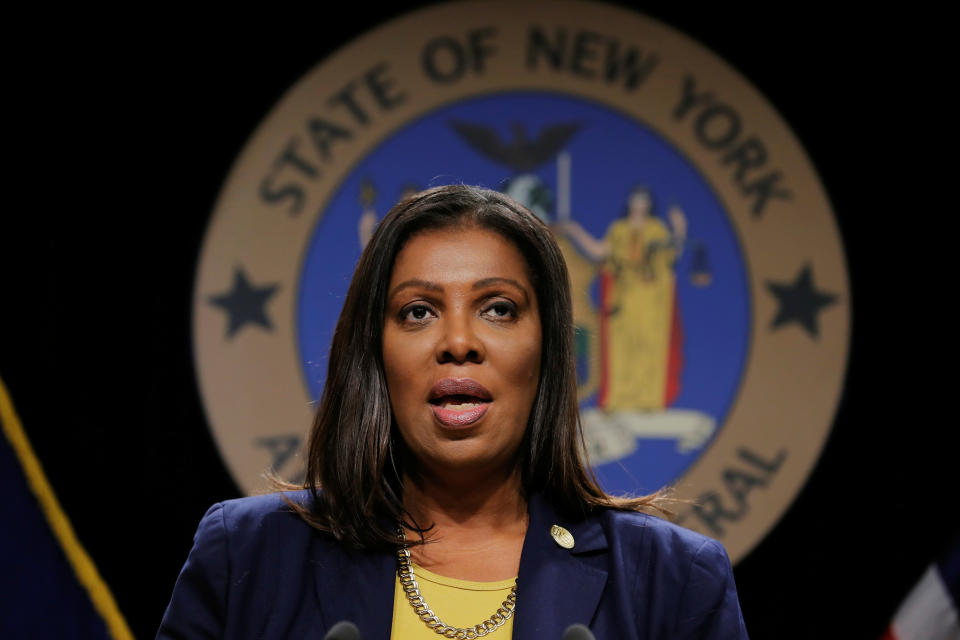
It’s hard to tell whether they had an impact, since speaking to regulators is a one-way street. Also, in July, at about the same time Wu began his roadshow, Facebook disclosed that it was already the subject of an FTC antitrust inquiry. In September, however, New York Attorney General Letitia James announced that she and seven other AGs (including Weiser) had started investigating Facebook. Three days later, the Wall Street Journal reported that the Justice Department, in an unusual turf battle with the FTC, was also insisting on investigating Facebook. By October, the ranks of state AGs pursuing Facebook had swelled from just 8 to 47. (Attorney General James’s office declined comment, and Weiser’s did not return messages.)
As for the notion that the Instagram and WhatsApp acquisitions should be reversed as violations of the Sherman or Clayton Acts, a Facebook spokesperson provided this statement: “Every acquisition carries considerable risks, but as a result of Facebook's teams, infrastructure, and experience, Instagram and WhatsApp overcame early challenges and today provide even more value to people and businesses. These acquisitions were carefully reviewed by regulators who looked at the facts in the market. As one of the many choices people have to connect and share, today we're focused on building the best products and services to give more people a voice.”
Although Wu’s pitch-deck called for aggressive interpretations of existing law, it did not require abandonment of the consumer welfare standard or reversal of any existing precedents. Any other tack at this point would be a formula for courtroom failure.
That presumably goes for all the cases being contemplated by regulators today, many of which are widely believed to be using the US v. Microsoft precedent as their template.
That’s why many pro-enforcement antitrust practitioners believe the more extreme Neo-Brandeisian demands are unnecessary. The key thing needed, in their view, is for regulators to purge themselves of the Chicago School’s frame of mind, which is characterized by extreme confidence in markets and mistrust of government intervention. That change alone might bring us to an antitrust regimen as robust as Europe’s, where substantive laws are not markedly different from our own.
“There needs to be some presumption about whether you are more trusting of the markets to self-correct or of the government’s ability to get it right,” said Anu Bradford, an expert on European competition law at Columbia Law School. “Europeans are not as worried about false positives. They are worried about false negatives.”
On the other hand, absent new rules, it’s not clear that digital platforms are as vulnerable as Elizabeth Warren thinks.
“The elements of the Chicago School approach that have been adopted by the courts aren’t going anywhere,” said Geoffrey Manne, a Chicago Schooler who is also the founder and president of the International Center for Law and Economics in Portland, Oregon. If Elizabeth Warren wants to break up Facebook, Manne continued, she’ll probably need new legislation first, because the impediments she’d face in the courts right now would be “massive.”
A bipartisan cry welling up from the masses
The problem Warren described in the presidential debate argument — giant platforms vigorously competing with the much smaller companies that are dependent on their platforms — does not clearly violate any existing law. As Amazon argued last month in a submission to chairman David Cicilline, of the House antitrust subcommittee, it’s never been illegal for a retailer (Walmart, say) to prominently display its own discounted house brands (Sam’s Choice, for instance) alongside the third-party brands they compete with on the retailer’s shelves.
Many experts think it will be hard to mount a major case against Amazon, in particular, absent some change in the rules. No matter how ruthlessly it expands into new lines of business, its low retail prices and beloved convenience make it a superstar under the consumer welfare standard.
And without that standard, the centrists tell us, antitrust law will become “an impressionistic mush,” as former FTC chairman Kovacic puts it. It won’t provide judges with guidance about how to prioritize the conflicting interests of consumers, small business owners, employees, local communities, and our democracy as a whole.
Wu protests that the approach he envisions could actually provide judges with better guidance than the current one. He favors adoptions of rules of the road that would define presumptively illegal conduct. For instance, buying a potential competitor (like Facebook purchasing Instagram) or effecting a merger that leaves just three competitors in a market instead of four, like T-Mobile's buying of Sprint, should be considered presumptively illegal, he says.
Take soccer as an analogy, he said. “You have these rules like no tripping, no hand balls.” Experts aren’t called in to speculate about whether a goal would’ve been scored if the player hadn’t been tripped. The rule says: “This is just forbidden. You stay away from it.”
In any case, the consumer welfare standard “has failed in terms of predictability,” Wu contended. “Right now the welfare standard asks you to assess, for any given transaction, what the total effects on welfare are. Which any honest economist will say is impossible.
“What are the welfare effects of our conversation right now? Probably positive, but I could’ve been doing something else with my time and you could’ve too. … So it comes down to these big battles of experts.”
The only thing you can reliably predict with the consumer welfare standard, said Wu, is that there will be little enforcement.
Which is no coincidence. That was Bork’s goal all along. But after 40 years of trusting his assumptions, there is widespread alarm about where we find ourselves: growing inequality of wealth and frightening consolidation across all sectors. Above all, we see a handful of enduring and ever-expanding tech behemoths that know more about us than we know about them; whose vast resources subtly taint our academies, nonprofits, and politicians; and whose private policy decisions, secret algorithms, and even negligent mistakes can sway election results.
A bipartisan cry is welling up from the masses demanding something new. Or, actually, something old.
Read more
Jack Dorsey: The enigmatic CEO who could save — or break — Western Democracy
Exclusive: Facebook ex-security chief: How ‘hypertargeting’ threatens democracy
Roger Parloff is a regular contributor to both Yahoo Finance and Newsweek, and has also been published in Yahoo News, The New York Times, ProPublica, New York Magazine, and NewYorker.com, among others. He was formerly an editor-at-large at Fortune Magazine.